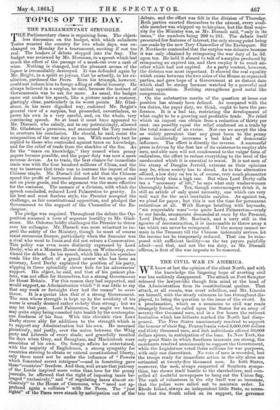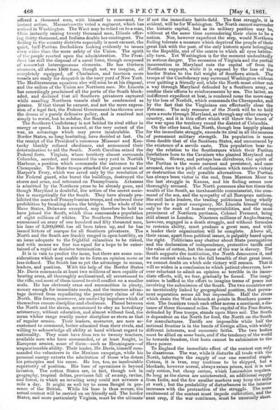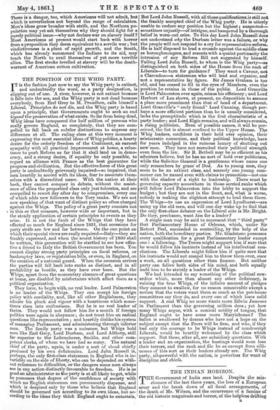THE CIVIL WAR IN AMERICA.
WE know at last the opinion of the silent North, and with the knowledge the lingering hope of averting civil war has suddenly disappeared. The attack on Fort Sumpter released the lawyer-like though firm mind at the head of the Administration from its constitutional qualms. That attack, at all events, was overt rebellion, and Mr. Lincoln set himself, with the steady calmness he has throughout dis- played, to bring the question to the issue of the sword. In a proclamation, which as a summons to civil war reads strangely formal, he called upon the States for an army of seventy-five thousand men, and in a few hours the reticent hesitation which has hitherto marked the North -had disap- peared. The Free States unanimously resolved to support the honour of their flag. Pennsylvania voted 3,000,000 dollars and thirty thousand men, and rich individuals offered 50,000 dollars apiece, in anticipation of the loan. In New York, the only great State in which Southern interests are strong, the merchants resolved unanimously to support the Government, while the Legislature voted three millions for war purposes, with only one dissentient. No vote of men is recorded, but the troops ready for immediate action in the city alone are estimated at twenty-five thousand men. In both States, moreover, the mob, always suspected of Southern sympa- thies, has shown itself hostile to the slaveholders, and com- pelled all doubtful newspapers to hang out the Union flag. The rush of volunteers in the city itself was so immense, that the police were called out to maintain order. In Rhode Island, always an independent little State, so eccen- tric that the South relied on its support, the governor offered a thousand men, with himself in command, for instant action. Massachusetts voted a regiment, which has arrived in Washington. The West may be relied on to a man, Ohio instantly raising twenty thousand men, Illinois offer- ing thirty thousand, and Indiana double her contingent. The feeling in the country districts especially is most earnest, the quiet, half-Puritan freeholders looking evidently to issues even wider than the mere safety of the Union. The spirit el the people reacted upon the administration. The Presi- dent has still the disposal of a naval force, though composed of somewhat heterogeneous elements. He has thirteen steamers, all above 1500 tons, though not, we imagine, all completely equipped, off Charleston, and fourteen more vessels are ready for despatch in the navy yard of New York. The Mediterranean squadron also will soon be at his disposal, and the sailors of the Union. are Northern men. Mr. Lincoln has accordingly proclaimed all the ports of the South block- aded, and declared that all Southern privateers captured while assailing Northern vessels shall be condemned as pirates. If that threat be earnest, and not the mere expres- sion of a legal fact, the Federal Government has thrown over the dream of a purely defensive policy, and is resolved not simply to resist, but to subdue, the South. The Southern Confederacy is not behind its rival either in energy or speed. It has secured, at the very outset of the war, an advantage which may prove incalculable. The Border States, so long hesitating, have decided at last. On the receipt of the President's summons Missouri and Ken- tucky blankly refused obedience, and announced their determination to aid the South. North Carolina seized the Federal forts. Virginia, whose territory almost surrounds Columbia, seceded, and menaced the navy yard in Norfolk Harbour, a position which commands the entrance to the Chesapeake. The State troops attacked the great arsenal at Harper's Ferry, which was saved only by the resolution of the Federal guard, who burnt the buildings, destroyed the stores and arms, and retreated on Pennsylvania. Arkansas is admitted by the Northern press to be already gone, and though Maryland is doubtful, the action of the secret socie- ties is energetically for the South. They have already pro- hibited the march of Pennsylvanian troops, and enforced their prohibition by breaking down the bridges. The whole of the Slave States, Delaware excepted, may therefore be held to have joined the South, which thus commands a population of eight millions of whites. The Southern President has summoned an army of one hundred and fifty thousand men, his loan of 3,500,000/. has all been taken up, and he has issued letters of marque for all Southern privateers. The North and the South are frankly ranged in open hostility, on an issue adequate to the frightful calamities to be risked, and with means we fear too equal for a hope to be enter- tained of a rapid or decisive termination.
It is in vain to predict the issue, but there are some con- siderations which may enable us to form an opinion more or less defined. The South has as yet the advantage in means, leaders, and position. With the help of the Border States Mr. Davie commands at least two millions of men capable of bearing arms, all thoroughly acclimatized, all accustomed to the rifle, and most of them inured to civil conflict on a smaller scale. He has obviously arms and ammunition in plenty, money enough for immediate needs, and the immense advan- tage derived from repudiating the pecuniary claims of the North. His forces, moreover, are united by impulses which of themselves ensure discipline and obedience. Placed between the North and the slaves, accustomed to obey an hereditary aristocracy, without education, and almost without food, the mean whites range readily under discipline as stern as that of regular armies. Their leaders, moreover, are men ac- customed to command, better educated than their rivals, and willing to acknowledge all ability at hand without regard to nationality. They must have from ten to twenty teachers, available men who have commanded, or at least fought, in European armies, some of them—such as Heuningsen—of unquestionable ability. Their leader, Mr. Davis, himself com- manded the volunteers in the Mexican campaign, while his personal energy extorts the admiration of those who detest his principles and his cause. He has, too, an incalculable superiority of position. His base of operations is beyond invasion. The cotton States are, in fact, though not in geography, tropical deltas, provinces full of swamp, ravine, and forest, in which an invading army could not advance a mile a day. It might as well try to cross Bengal in pre- sence of the British. While his base is thus secure, the actual contest will be carried on on friendly soil. The border States, and more particularly Virginia, must be the ultimate if not the immediate battle-field. The first struggle, it is evident, will be for Washington. The North cannot surrender the historic capital, bad as its military position may be, without at the same time surrendering their claim to be a nation. Nor, however expedient the step, would Northern feeling tolerate a measure which deprived the people of their great link with the past, of the only historic spots belonging to the Republic, and of the centre to which all eyes habitu- ally turn. Yet Washington is for the moment undoubtedly in serious danger. The secession of Virginia and the partial insurrection in Maryland cuts the capital off from its Northern supports, while it is exposed by the loss of the border States to the full weight of Southern attack. The troops of the Confederacy may surround Washington without ever quitting a friendly soil, while the North must either cut a way through Maryland defended by a Southern army, or confine their efforts to reinforcements by sea. The latter, an indifferent expedient at best, is rendered none the more easy by the loss of Norfolk, which commands the Chesapeake, and by the fact that the Virginians can effectually close the Potomac. The only resource of the North will be to hold open a route through Maryland, as through any other enemy's country, and it is this effort which will throw the brunt of the war upon the territory round the district of Columbia. On the other hand, the North, though less happily placed for the immediate struggle, exceeds its rival in all the sources of permanent military strength. Its population is more than double that of the Southern States, and unmenaced by the existence of a servile caste. This population bear to- day the relation to the Southerners which their Puritan forefathers bore to the Cavaliers who planted Maryland and Virginia. Slower, and perhaps less chivalrous, the spirit of the Puritan is the more earnest and persistent, and once aroused, rises to a pitch of enthusiasm which renders victory or destruction the only possible alternatives. The Puritan has always been victor in the end, from Marston Moor to the last struggle in Kansas, and his feeling seems now thoroughly aroused. The North possesses also ten times the wealth of the South, an inexhaustible commissariat, the com- mand of the sea, and the sympathy of all European nations. She still lacks leaders, the trading politicians being wholly unequal to a great emergency, Mr. Lincoln himself rising only to the rank of honest respectabilities, and the most prominent of Northern partisans, Colonel Fremont, being still absent in London. Nineteen millions of Anglo-Saxons, however, engaged in a death struggle, and without formulas to restrain ability, must produce a great man, and with a leader their organization will be complete. Above all, their cause, apart from political issues, is palpably based upon the right. Politicians may chatter about State prerogatives and the declaration of independence, protective tariffs and the value of cotton, but the cause of the war is slavery. The South supports the institution, the North denounces it, and as the contest widens to the full breadth of that great issue, we cannot doubt on which side victory will remain. That it will so widen is a conclusion to which patient observers, how- ever reluctant to admit an opinion so terrible in its imme- diate effects, will, we fear, gradually be forced. The imagi- nation is baffled in the effort to imagine terms of peace not involving the submission of the South. The two countries are so inextricably linked by geographical position, that perma- nent separation seems all but impossible. Half the rivers which drain the West debouch at points in Southern posses- sion. The frontiers touch each other across a continent, a dis- tance of three thousand miles. The capital of the Free States, defended by Free troops, stands upon Slave soil. The South is dependent on the North for food, the North on the South for manufactures. Tariffs are impossible while half the national frontier is in the hands of foreign allies, with widely different interests, and economic faiths. The two bodies must be allied on some basis, and if the tendency of the world be towards freedom, that basis cannot be submission to the Slave power. To England the immediate effect of the contest can only be disastrous. The war, while it disturbs all trade with the North, interrupts the supply of our one essential staple. Cotton, it is true, may continue to be shipped, but a blockade, however unreal, always raises prices, and it is not only cotton, but cheap cotton, which Lancashire requires. So long as the slaves are uninterested, an additional supply from India, and the few smaller markets may keep the mills at work ; but the probability of disturbances in the interior increases with the protraction of the struggle. The mere excitement of the contest must impede cultivation, and the next crop, if the war continues, must be unusually short. There is a danger, too, which Americans will not admit, but which is nevertheless not beyond the range of calculation. Men's ideas grow broader with strife, and the Northern po- pulation may yet ask themselves why they should fight for a purely political issue—why not declare war on slavery itself P Most Americans at present would start back with horror from a proposition they deem equivalent to a servile war ; but vindictiveness is a plant of rapid growth, and the South, which has already summoned the Indians to its aid, may teach the North to avail themselves of yet more terrible allies. The first stroke levelled at slavery will be the death- warrant of American cotton cultivation.
































 Previous page
Previous page